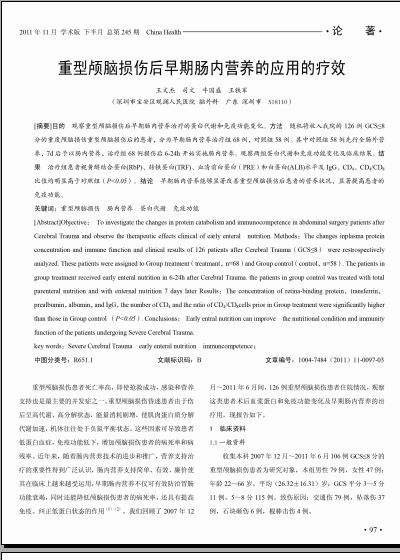重型颅脑损伤后早期肠内营养的应用的疗效(1)
 |
| 第1页 |
参见附件(2180KB,3页)。
[摘要]目的观察重型颅脑损伤后早期肠内营养治疗的蛋白代谢和免疫功能变化。方法随机将收入我院的126例GCS≤8分的重度颅脑损伤重型颅脑损伤后的患者,分为早期肠内营养治疗组68例,对照组58例。其中对照组58例先行全肠外营养,7d后予以肠内营养,治疗组68例损伤后6-24h开始实施肠内营养。观察两组蛋白代谢和免疫功能变化及临床结果。结果治疗组患者视黄醇结合蛋白(RbP)、转铁蛋白(TRF)、血清前白蛋白(PRE)和白蛋白(ALB)水平及IgG、CD4、CD4/CD8比值均明显高于对照组(P<0.05)。结论早期肠内营养能够显著改善重型颅脑损伤后患者的营养状况,显著提高患者的免疫功能。
关键词:重型颅脑损伤肠内营养蛋白代谢免疫功能
[Abstract]Objective: To investigate the changes in protein catabolism and immunocompetence in abdominal surgery patients after Cerebral Trauma and observe the therapeutic effects clinical of early enteralnutrition. Methods:The changes inplasma protein concentration and immune function and clinical results of 126 patients after Cerebral Trauma(GCS≤8) were restrospectively analyzed. These patients were assigned to Group treatment(treatmant,n=68)and Group control(control,n=58). The patients in group treatment received early enteral nutrition in 6-24h after Cerebral Trauma. the patients in group control was treated with total parenteral nutrition and with enternal nutrition 7 days later Results:The concentration of retina-binding protein,transferrin, prealbumin,albumin,and IgG,the number of CD4 and the ratio of CD4/CD8cells prior in Group treatment were significantly higher than those in Group control (P<0.05). Conclusions: Early entral nutrition can improvethe nutritional condition and immunity function of the patients undergoing Severe Cerebral Trauma.
key words:Severe Cerebral Traumaearly enteral nutritionimmuncompetence;
中图分类号:R651.1 文献标识码:B文章编号:1004-7484(2011)11-0097-03
重型颅脑损伤患者死亡率高,即使抢救成功,感染和营养支持也是最主要的并发症之一。重型颅脑损伤昏迷患者由于伤后呈高代谢、高分解状态,能量消耗剧增,使肌肉蛋白质分解代谢加速,机体往往处于负氮平衡状态。这些因素可导致患者低蛋白血症,免疫功能低下,增加颅脑损伤患者的病死率和病残率。近年来,随着肠内营养技术的进步和推广,营养支持治疗的重要性得到广泛认识,肠内营养支持简单、有效、廉价使其在临床上越来越受运用,早期肠内营养不仅可有效防治胃肠功能衰竭,同时还能降低颅脑损伤患者的病死率,还具有提高免疫、纠正低蛋白状态的作用〔1〕〔2〕。我们回顾了2007年12月~2011年6月间,126例重型颅脑损伤患者住院情况,观察这类患者术后血浆蛋白和免疫功能变化及早期肠内营养的治疗用,现报告如下。
1临床资料
1.1一般资料
收集本科2007年12月~2011年6月106例GCS≤8分的重型颅脑损伤患者为研究对象,本组男性79例,女性47例;年龄22~66岁,平均(26.32±16.31)岁;GCS平分3~5分11例,5~8分115例。致伤原因:交通伤79例,坠落伤37例,石块砸伤6例,棍棒击伤4例。
1.2分组
每位患者入院均采用随机分组方式,将126例病人分为两组。48例病人分为对照组,先行全肠外营养,7d后予以肠内营养。58例患者分为治疗组,伤后6~24h开始实施肠内营养。两组年龄、对症支持治疗和并发症等无显著性差异 ......
您现在查看是摘要介绍页,详见PDF附件(2180KB,3页)。